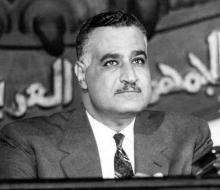Sometimes it’s difficult to track all of the changes in the Middle East in recent decades, as well as to chart the United States’ relationship to the Middle Eastern countries. Here’s a brief history of Egypt’s King Nasser who ruled 1956 until his death in 1970. Through manipulation of facts and propaganda, Nasser used the Suez War of 1956, the creation of the United Arab Republic in 1958, and the Israeli re-routing of the Jordanian River in 1963 to advance the cause of Arab nationalism.
The Suez War began because Western powers didn’t approve of Nasser. John Foster Dulles, the U.S. secretary of state, didn’t approve of Nasser because Nasser recognized the Communist People’s Republic of China. Anthony Eden, the Prime Minister of Britain, didn’t approve of Nasser because Nasser encouraged King Husayn of Jordan to fire John Glubb, the British commander of the Arab Legion. For these reasons, these nations would not give Nasser money to fund Egypt’s proposed Aswan Dam.
Nasser retaliated by nationalizing the Anglo-French Suez Canal Company. Eden responded to Nasser's move by calling French and Israeli forces to Egypt to try and run Nasser out of power. The United States was outraged by Eden’s response and forced the troops to withdraw.
Even though the Suez War of 1956 was halted due to U.S. intervention, Nasser, who was in control of the Egyptian media because all those who worked there feared him, propagandized this event in such a way Nasser was heralded by the Arab peoples as “the symbol of Arab steadfastness against the forces of imperialism.” This event bettered the cause of Arab nationalism by adding to Egypt’s, and therefore Nasser’s, reputation as the epitome of an Arab State and an Arab ruler. Not only did Egypt have the best culture, but it could protect itself from Western imperial forces or forces supported by Western imperialists.
Similarly, the United Arab Republic’s creation was surrounded by something Nasser later wanted to downplay—both Egypt and Syria were originally skeptical about a Union. Syria wanted to create the Union because there was so much political disunity within its borders that leaders worried for the country's preservation. When Syrian officials presented their plan to Nasser he was also initially hesitant. Eventually, however, he agreed with the plan because he needed to continue being involved with acts which would go along with his nationalistic agenda. So, Syrian officials flew to Cairo on February 1 and the Union was formed.
Again, the Nasser-controlled Egyptian media skewed the events leading up to the creation of the Union and the Union inspired a nationalistic frenzy because people knew such a union was possible. Nasser used this event to illustrate how his plan for one large Arab state was possible, and the UAR was the first step in his dream. The public showed their response to Nasser and for Arab nationalism through public displays of adoration. When the Egyptian King came to Damascus, for example, “public squares…transformed into something akin to areas of public worship” and an “adoring multitude camped outside” Nasser’s door.
Israelis re-routing the Jordan River to flow mostly through only their borders was taken by Syria as an act of war. Israel wanted to divert seventy-five percent of the Jordan River away from other Arab states and into its own borders. Nasser originally did not want to get involved in a potential war with Israel because he had troops stationed in Yemen. Soon, however, Nasser had a change of heart and Egypt--no longer in a union with Syria, but still pledged in a military allegiance--joined forces, allegedly for Palestine’s sake. This allegiance brought about the creation of the Palestine Liberation Organization and Palestine Liberation Army, both of which marked the beginnings of a reemergence in Arab-supported Palestinian nationalism.
Nasser again played down his initial hesitation to fight Israel at this point and used this event to change his goal from an “Arab unity” to an “Arab solidarity” because Arab nationalism was failing. Nasser knew his calling for Palestinian nationalism and a Palestinian state would not mesh with his Arab nationalistic view, so he made Israel out to be the enemy of all the Arab states, not only Syria and Jordan.
Nasser, and Arab nationalism’s, greatest ally throughout this period seemed to be Nasser’s superior propaganda skills and the influential Egyptian media, which he controlled.
Sources and further reading:
Dawisha, Adeed. Arab Nationalism in the Twentieth Century. Princeton, NJ: Princeton University Press, 2003.
Gelvin, James L. The Israel-Palestine Conflict: One Hundred Years of War. New York: Cambridge University Press, 2005.
